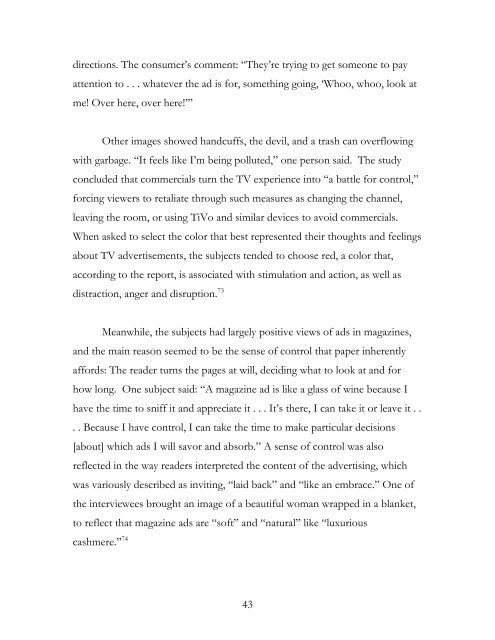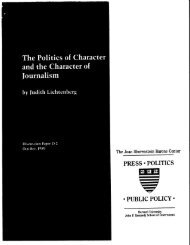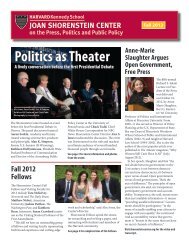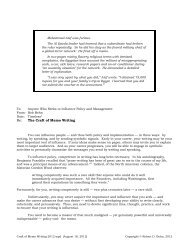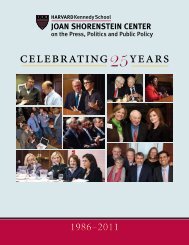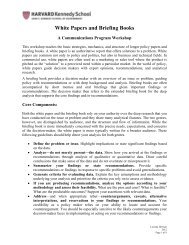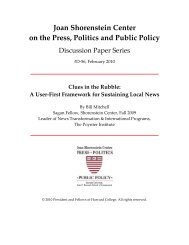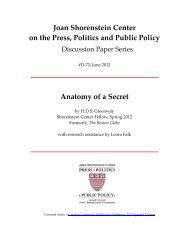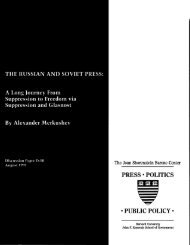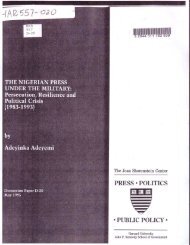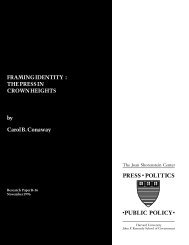Why Paper Is Eternal - Joan Shorenstein Center on the Press ...
Why Paper Is Eternal - Joan Shorenstein Center on the Press ...
Why Paper Is Eternal - Joan Shorenstein Center on the Press ...
You also want an ePaper? Increase the reach of your titles
YUMPU automatically turns print PDFs into web optimized ePapers that Google loves.
directi<strong>on</strong>s. The c<strong>on</strong>sumer’s comment: “They’re trying to get some<strong>on</strong>e to pay<br />
attenti<strong>on</strong> to . . . whatever <strong>the</strong> ad is for, something going, ‘Whoo, whoo, look at<br />
me! Over here, over here!’”<br />
O<strong>the</strong>r images showed handcuffs, <strong>the</strong> devil, and a trash can overflowing<br />
with garbage. “It feels like I’m being polluted,” <strong>on</strong>e pers<strong>on</strong> said. The study<br />
c<strong>on</strong>cluded that commercials turn <strong>the</strong> TV experience into “a battle for c<strong>on</strong>trol,”<br />
forcing viewers to retaliate through such measures as changing <strong>the</strong> channel,<br />
leaving <strong>the</strong> room, or using TiVo and similar devices to avoid commercials.<br />
When asked to select <strong>the</strong> color that best represented <strong>the</strong>ir thoughts and feelings<br />
about TV advertisements, <strong>the</strong> subjects tended to choose red, a color that,<br />
according to <strong>the</strong> report, is associated with stimulati<strong>on</strong> and acti<strong>on</strong>, as well as<br />
distracti<strong>on</strong>, anger and disrupti<strong>on</strong>. 73<br />
Meanwhile, <strong>the</strong> subjects had largely positive views of ads in magazines,<br />
and <strong>the</strong> main reas<strong>on</strong> seemed to be <strong>the</strong> sense of c<strong>on</strong>trol that paper inherently<br />
affords: The reader turns <strong>the</strong> pages at will, deciding what to look at and for<br />
how l<strong>on</strong>g. One subject said: “A magazine ad is like a glass of wine because I<br />
have <strong>the</strong> time to sniff it and appreciate it . . . It’s <strong>the</strong>re, I can take it or leave it . .<br />
. . Because I have c<strong>on</strong>trol, I can take <strong>the</strong> time to make particular decisi<strong>on</strong>s<br />
[about] which ads I will savor and absorb.” A sense of c<strong>on</strong>trol was also<br />
reflected in <strong>the</strong> way readers interpreted <strong>the</strong> c<strong>on</strong>tent of <strong>the</strong> advertising, which<br />
was variously described as inviting, “laid back” and “like an embrace.” One of<br />
<strong>the</strong> interviewees brought an image of a beautiful woman wrapped in a blanket,<br />
to reflect that magazine ads are “soft” and “natural” like “luxurious<br />
cashmere.” 74<br />
43


